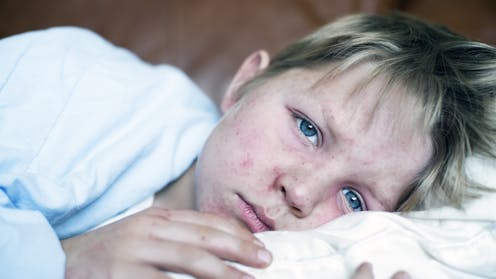
- Professor, Discipline of Paediatrics and Child Health, University of Sydney

If a newborn is exposed to hepatitis B at birth, there’s a 90% chance they’ll develop a lifelong infection.

Since the COVID-19 pandemic, vaccine rates have been dropping.

Measles is on the rise globally. We need to step up vaccination rates.

Former MP Dr Kerryn Phelps’ COVID vaccination experience has prompted discussion about severe side effects after COVID vaccines. Here’s how they’re tracked, confirmed and prevented.

Australia currently has its first cases of childhood respiratory diphtheria since 1992. So why are we seeing diphtheria now? And what role does travel play in its spread?

A serious event such as a blood clot could be caused by an underlying medical condition, a medication the person was taking at the time, or some other factor unrelated to the vaccine.

We already track potential vaccine side-effects in Australia. So we’ll be using, and building on, years of experience in monitoring any long-term effects of COVID-19 vaccines.

Based on closely following outbreaks in schools and early learning centres across Australia throughout 2020, we have enough evidence to show how students can return to school safely.

Any COVID-19 vaccine is likely to be given first to higher risk groups before it is given to children. But we still need vaccines that are safe and effective for them too.

You no longer have to go to your GP to get your flu shot or catch up on vaccinations you missed earlier in life or have waning immunity to. But they’re unlikely to be free.

Children’s immune systems are more vulnerable to the flu; even kids who are otherwise healthy can develop complications. The best way to protect children is by having them vaccinated.

There are many reasons adults might not be up to date with the vaccinations they need. Catching up is easy enough, and vitally important in the fight against infectious diseases.

We’ve had the measles vaccine in Australia since 1968, but a two-dose program was only introduced in 1992. And if you haven’t had the second dose, you’re at risk of contracting measles.

Thanks to successful vaccination programs, Australia has just been declared free of rubella. Continued vigilance is important to make sure it doesn’t come back.

International outbreaks of the almost-forgotten disease diphtheria and pockets of low immunisation coverage put Australians at risk of catching the disease.

The flu vaccine isn’t perfect but it’s the best way to protect against these potentially harmful viruses. Most children aged six months to five years are eligible for a free vaccine in 2018.

Vaccines against multiple diseases in one jab strengthen kids’ immune systems, not weaken them. Here’s why we shouldn’t fear these combination vaccines.

As we head towards flu season, many people are wondering if it’s worth getting vaccinated against influenza and if so, when. Here’s what you need to know.

Speaking on the ABC program Insiders, One Nation leader Pauline Hanson suggested there are tests available to see if children will have an adverse reaction to vaccinations. We asked three experts.

From November 1, the shingles (herpes zoster) vaccine will be available for free to people aged 70 to 79 years. So how and why do you get shingles, and who should be vaccinated?

Pregnancy can be a confusing time, raising a number of questions for women. This includes what vaccines to have and which to avoid.

Immunisation in Australia isn’t compulsory – and doesn’t need to be controversial. Most Australians recognise the incredible benefits that vaccination provides to prevent serious disease.

Most of us will receive the majority of our vaccinations in childhood. But Australian adults still die and become disabled from vaccine-preventable diseases. Immunisations are therefore an important preventive…

Changes to the National Immunisation Program schedule coming into effect today (July 1, 2013) will see two fewer injections given to young children. The changes represent a more efficient way of delivering…
Contact Kristine for
- General
- Media request
- Speaking request
- Consulting / Advising
- Research collaboration
- Research supervision
- Sydney
- Website
- Article Feed
- ORCID
- Joined